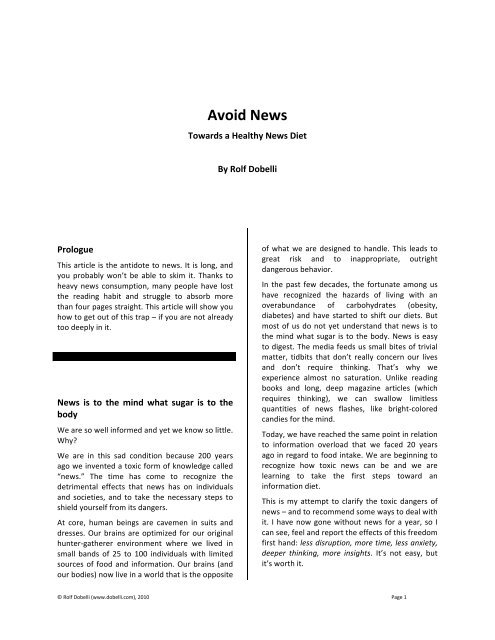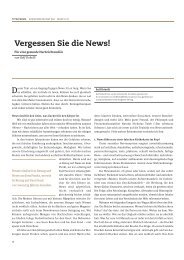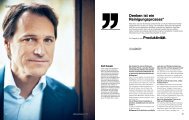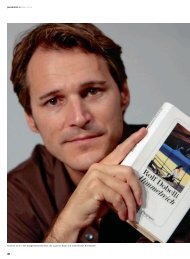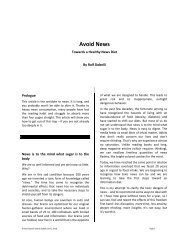Avoid News - Rolf Dobelli
Avoid News - Rolf Dobelli
Avoid News - Rolf Dobelli
You also want an ePaper? Increase the reach of your titles
YUMPU automatically turns print PDFs into web optimized ePapers that Google loves.
No 7 – <strong>News</strong> changes the structure of your brain <strong>News</strong> works like a drug. As stories develop, we naturally want to know how they continue. With hundreds of arbitrary story lines in our heads, this craving is increasingly compelling and hard to ignore. Why is news addictive? Once you get into the habit of checking the news, you are driven to check it even more often. Your attention is set on fast-‐breaking events, so you hunger for more data about them. This has to do with a process called “long-‐term potentiation” (LTP) and the reward circuits in your brain. Addicts seek more of an addictive substance to get their fix, because they need more stimulation than non-‐addicts to reach a satisfying reward threshold. If you set your attention on other things – like literature, science, art, history, cooking, pet grooming, whatever – you will become more focused on those things. That’s just how the brain works. Science used to think that our brain, the dense connections formed among the 100 billion neurons inside our skulls, was largely fixed by the time we reached adulthood. Today we know that this is not the case. The human brain is highly plastic. Nerve cells routinely break old connections and form new ones. When we adapt to a new cultural phenomenon, including the consumption of news, we end up with a different brain. Adaptation to news occurs at a biological level. <strong>News</strong> reprograms us. That means our brain works differently even when we’re not consuming news. And that’s dangerous. The more news we consume, the more we exercise the neural circuits devoted to skimming and multitasking while ignoring those used for reading deeply and thinking with profound focus. Most news consumers – even if they used to be avid book readers – have lost the ability to read and absorb lengthy articles or books. After four, five pages they get tired, their concentration vanishes, they become restless. It’s not because they got older or their schedules became more onerous. It’s because the physical structure of their brains has changed. In the words of Professor Michael Merzenich (University of California, San Francisco), a pioneer in the field of neuroplasticity: “We are training our brains to pay attention to the crap.” Deep reading is indistinguishable from deep thinking. When you consume news, your brain structurally changes. This means that the way you think changes. Regaining the capacity for concentration and contemplation will take nothing less than a radical news-‐free diet. No 8 – <strong>News</strong> is costly <strong>News</strong> wastes time. It exacts exorbitant costs. <strong>News</strong> taxes productivity three ways. First, count the consumption-‐time that news demands. That’s the time you actually waste reading, listening to or watching the news. Second, tally up the refocusing time – or switching cost. That’s the time you waste trying to get back to what you were doing before the news interrupted you. You have to collect your thoughts. What were you about to do? Every time you disrupt your work to check the news, reorienting yourself wastes more time. Third, news distracts us even hours after we’ve digested today’s hot items. <strong>News</strong> stories and images may pop into your mind hours, sometimes days later, constantly interrupting your train of thought. Why would you want to do that to yourself? If you read the newspaper for 15 minutes each morning, then check the news for 15 minutes during lunch and 15 minutes before you go to bed, you’re eating substantial time. Then, add five minutes here and there when you’re at work, plus distraction and refocusing time. You will lose © <strong>Rolf</strong> <strong>Dobelli</strong> (www.dobelli.com), 2010 Page 6
No 11 – Reported facts are sometimes wrong, forecasts always Sometimes, reported facts are simply mistaken. With reduced editorial budgets at major publications, fact checking may be an endangered step in the news process. The New Yorker magazine is legendary for its fact checking. The story goes that when an article mentioned the Empire State Building, someone from the fact-‐checking department would go out and visually verify that, in fact, the building was still standing. I don’t know if the story is true, but it highlights a point. Today, the fact checker is an endangered species at most news companies (though still alive and well at The New Yorker). Many news stories include predictions, but accurately predicting anything in a complex world is impossible. Overwhelming evidence indicates that forecasts by journalists and by experts in finance, social development, global conflicts and technology are almost always completely wrong. So, why consume that junk? Did the newspapers predict World War I, the Great Depression, the sexual revolution, the fall of the Soviet empire, the rise of the Internet, resistance to antibiotics, the fall of Europe’s birth rate or the explosion in depression cases? Maybe, you’d find one or two correct predictions in a sea of millions of mistaken ones. Incorrect forecast are not only useless, they are harmful. To increase the accuracy of your predictions, cut out the news and roll the dice or, if you are ready for depth, read books and knowledgeable journals to understand the invisible generators that affect our world. No 12 – <strong>News</strong> is manipulative Our evolutionary past has equipped us with a good bullshit detector for face-‐to-‐face interactions. We automatically use many clues to detect manipulation, clues that go beyond the verbal message and include gesture, facial expression, and signs of nervousness such as sweaty palms, blushing and body odor. Living in small bands of people, we almost always knew the background of the messenger. Information always came with a rich set of meta-‐data. Today, even conscientious readers find that distinguishing even-‐handed news stories from ones that have a private agenda is difficult and energy consuming. Why go through that? Stories are selected or slanted to please advertisers (advertising bias) or the owners of the media (corporate bias), and each media outlet has a tendency to report what everyone else is reporting, and to avoid stories that will offend anyone (mainstream bias). The public relations (PR) industry is as large as the news reporting industry – the best proof that journalists and news organizations can be manipulated, or at least influenced or swayed. Corporations, interest groups and other organizations would not expend such huge sums on PR if it didn’t work. If spinmeisters can manipulate journalists, who have a natural skepticism toward powerful organizations, what makes you think you can escape their trickery? Take the Nurse Nayirah story. Nayirah was a 15-‐year-‐old Kuwaiti girl who testified to the U.S. Congress during the run up to the 1991 Gulf War. She alleged that she had witnessed the murder of infant children by Iraqi soldiers in Kuwait. Virtually every media outlet covered the story. The U.S. public was outraged, which in turn pushed Congress closer to approving the war. Her testimony, which all media outlets regarded as credible at the time, has since come to be regarded as wartime propaganda. Journalism shapes a common picture of the world and a common set of narratives for discussing it. It © <strong>Rolf</strong> <strong>Dobelli</strong> (www.dobelli.com), 2010 Page 8
sets the public agenda. Hold on: do we really want news reporters to set the public agenda? I believe that agenda setting by the media is just bad democracy. No 13 – <strong>News</strong> makes us passive <strong>News</strong> stories are overwhelmingly about things you cannot influence. This sets readers up to have a fatalistic outlook on the world. Compare this with our ancestral past, where you could act upon practically every bit of news. Our evolutionary past prepared us to act on information, but the daily repetition of news about things we can’t act upon makes us passive. It saps our energy. It grinds us down until we adopt a worldview that is pessimistic, desensitized, sarcastic and fatalistic. If the human brain encounters a barrage of ambiguous information without being able to act upon that information, it can react with passivity and a sense of victimhood. The scientific term is learned helplessness. It’s a bit of a stretch, but I would not be surprised if news consumption at least partially contributes to the widespread disease of depression. Viewed on a timeline, the spread of depression coincides almost perfectly with the growth and maturity of the mass media. Maybe it’s a coincidence, or maybe the constant onslaught of fire, famine, flood and failure adds to depression, even if these sad reports come from far away. 14 – <strong>News</strong> gives us the illusion of caring Kathleen Norris (even if I don’t share most of her ideas) said it best: “We may want to believe that we are still concerned, as our eyes drift from a news anchor announcing the latest atrocity to the NBA scores and stock market quotes streaming across the bottom of the screen. But the ceaseless bombardment of image and verbiage makes us impervious to caring.” <strong>News</strong> wraps us in a warm global feeling. We are all world citizens. We are all connected. The planet is just one global village. We sing “We Are the World” and wave the little flame of our lighters in perfect harmony with thousands of others. This gives us a glowing, fuzzy feeling that delivers the illusion of caring but doesn’t get us anywhere. This allure of anything bespeaking global brotherhood smells like a gigantic chimera. The fact is, consuming news does not make us more connected to each other. We are connected because we interact and trade. No 15 – <strong>News</strong> kills creativity Things we already know limit our creativity. This is one reason that mathematicians, novelists, composers and entrepreneurs often produce their most creative works at a young age. They are oblivious to much that has been tried before. Their brains enjoy a wide, uninhabited space that emboldens them to come up with and pursue novel ideas. I don’t know a single truly creative mind who is a news junkie – not a writer, not a composer, mathematician, physician, scientist, musician, designer, architect or painter. On the other hand, I know a whole bunch of viciously uncreative minds who consume news like drugs. The creativity-‐killing effect of news might also be due to something simpler we’ve discussed before: distraction. I just can’t imagine producing novel ideas with the distraction that news always delivers. If you want to come up with old solutions, © <strong>Rolf</strong> <strong>Dobelli</strong> (www.dobelli.com), 2010 Page 9
ead news. If you are looking for new solutions, don’t read news. What to do instead Go without news. Cut it out completely. Go cold turkey. Make news as inaccessible as possible. Delete the news apps from your iPhone. Sell your TV. Cancel your newspaper subscriptions. Do not pick up newspapers and magazines that lie around in airports and train stations. Do not set your browser default to a news site. Pick a site that never changes. The more stale the better. Delete all news sites from your browser’s favorites list. Delete the news widgets from your desktop. If you want to keep the illusion of “not missing anything important”, I suggest you glance through the summary page of the Economist once a week. Don’t spend more than five minutes on it. Read magazines and books which explain the world – Science, Nature, The New Yorker, The Atlantic Monthly. Go for magazines that connect the dots and don’t shy away from presenting the complexities of life – or from purely entertaining you. The world is complicated, and we can do nothing about it. So, you must read longish and deep articles and books that represent its complexity. Try reading a book a week. Better two or three. History is good. Biology. Psychology. That way you’ll learn to understand the underlying mechanisms of the world. Go deep instead of broad. Enjoy material that truly interests you. Have fun reading. The first week will be the hardest. Deciding not to check the news while you are thinking, writing or reading takes discipline. You are fighting your brain’s built-‐in tendency. Initially, you will feel out of touch or even socially isolated. Every day you will be tempted to check your favorite news Web site. Don’t do it. Stick to the cold-‐turkey plan. Go 30 days without news. After 30 days, you will have a more relaxed attitude toward the news. You will find that you have more time, more concentration and a better understanding of the world. After a while, you will realize that despite your personal news blackout, you have not missed – and you’re not going to miss – any important facts. If some bit of information is truly important to your profession, your company, your family or your community, you will hear it in time – from your friends, your mother-‐in-‐law or whomever you talk to or see. When you are with your friends, ask them if anything important is happening in the world. The question is a great conversation starter. Most of the time, the answer will be: “not really.” Are you afraid that living a news-‐free existence will make you an outcast at parties? Well, you might not know that Lindsay Lohan went to jail, but you will have more intelligent facts to share – about the cultural meaning of the food you are eating or the discovery of exosolar planets. Never be shy about discussing your news diet. People will be fascinated. Good <strong>News</strong> Society needs journalism – but in a different way. Investigative journalism is relevant in any society. We need more hard-‐core journalists digging into meaningful stories. We need reporting that polices our society and uncovers the truth. The best example is Watergate. But important findings don’t have to arrive in the form of news. Often, reporting is not time sensitive. Long journal articles and in-‐depth books are fine forums for investigative journalism – and now that you’ve gone cold turkey on the news, you’ll have time to read them. ▪ © <strong>Rolf</strong> <strong>Dobelli</strong> (www.dobelli.com), 2010 Page 10
Disclaimer The above statements reflect the most truthful viewpoint I can achieve at the time of this writing. I reserve the right to revise my views at any time. I might even indulge in the freedom of contradicting myself. I have done so in the past and will most certainly do so in the future. The only reason I would change my views (a switch which would undoubtedly be noticed by the “consistency police” (usually journalists with good high-‐school degrees) is because the new version is closer to the truth, not ever because I would gain any personal advantage. ▪ The Book This manifesto has been published in August 2010 on www.dobelli.com. I have made small changes since. In the Spring of 2013 The Art of Thinking Clearly came out. The book highlights some of the cognitive errors associated with news consumption. Below you find the two covers (UK and US editions) © <strong>Rolf</strong> <strong>Dobelli</strong> (www.dobelli.com), 2010 Page 11


